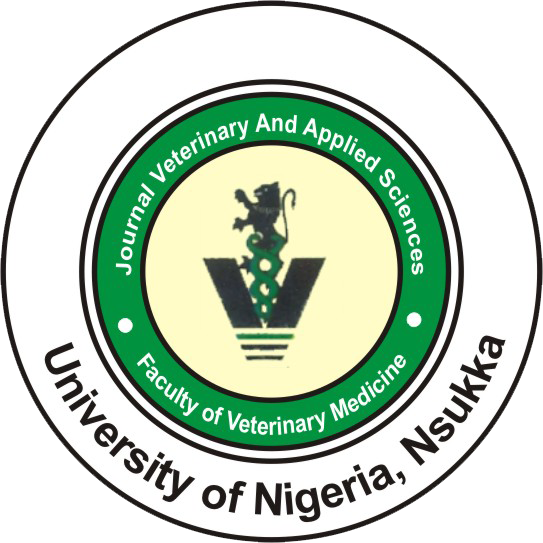University of Nigeria
ISSN: 2315 - 6856
e-ISSN: 2636 - 5553
Journal volumes
Powered by: RockSystems Global Services Ltd.
rocksystemsglobal@gmail.com (+2348035271306)
www.rocksystemsglobal.com
Volume 15, Issue 1: 2025 - Article 190
Abstract
Avian lymphoid leukosis remains a leading neoplastic disease in commercial layer chicken flocks worldwide, and represents an emergent threat to Nigeria’s rapidly expanding poultry industry. We report an outbreak of lymphoid leukosis in a 33-week old ISA Brown layer chicken flock (n = 20,000) in Southwestern Nigeria, characterized by progressive mortality exceeding 25% over three weeks, a 40% decline in egg production, with clinical signs of emaciation, pale combs, and greenish diarrhoea. Ten representative carcasses (mean body weight 1050 g) were examined. Grossly, nine of ten birds were severely emaciated; eight exhibited hepatomegaly (liver up to 11 × 8 cm; mean weight 80 g), and all livers bore multiple grey-white nodules (0.1 – 3 cm). Splenomegaly (up to 6 cm; 52 g) and disseminated neoplastic nodules in spleen, ovary, kidney, mesentery and caecal tonsils were recorded, and this confirmed multi-systemic involvement. Giemsa-stained impression smears of the hepatic nodules revealed a monomorphic population of medium to large lymphoid cells with high nuclear-to-cytoplasmic ratio, vesicular chromatin, prominent nucleoli, basophilic cytoplasm and occasional mitoses. Histopathology demonstrated well-circumscribed hepatic nodules of lymphoblasts replacing hepatic plates (3 – 4 mitoses/HPF), adjacent hepatocellular vacuolar degeneration and periportal lymphoid aggregates. Similar lymphoid effacement was observed in the spleen and ovaries, while the peripheral nerves remained intact; features pathognomonic for lymphoid leukosis and distinguishing it from Marek’s disease and Reticuloendotheliosis. In Nigeria, where rearing of commercial layer chickens underpins food security and livelihoods, lymphoid leukosis outbreaks precipitate substantial economic losses via mortality, reduced egg production and carcass condemnations. This case report underscores the need for accurate diagnosis and control of the disease to safeguard the poultry sector from the huge economic losses.
Keywords: Lymphoid leukosis; Case report; Layer chicken flock; Nigeria; Pathology; Cytology; Histopathology.
How to cite this article:
Ezeugwu CC, Olaifa OS, Akanbi OB and Sanusi F (2025). Lymphoid leukosis in a commercial layer chicken flock: A case report with detailed necropsy, cytology and histopathological findings. Journal of Veterinary and Applied Sciences, 15(1): 1050 – 1058.
*Correspondence: E-mail: sanusi.f@unilorin.edu.ng Phone: +2348067650602

Lymphoid leukosis in a commercial layer chicken flock: A case report with detailed necropsy, cytology and histopathological findings
Chukwudi C. Ezeugwu 1, Olanrewaju S. Olaifa 1, Olatunde B. Akanbi 2 and Fatima Sanusi 3 *
1 Department of Veterinary Pathology, Faculty of Veterinary Medicine, University of Ibadan, Oyo State, Nigeria.
2 Department of Veterinary Pathology, Faculty of Veterinary Medicine, University of Ilorin, Kwara State, Nigeria.
3 Department of Veterinary Physiology and Biochemistry, Faculty of Veterinary Medicine, University of Ilorin, Kwara State, Nigeria.
Download .pdf copy here >>






